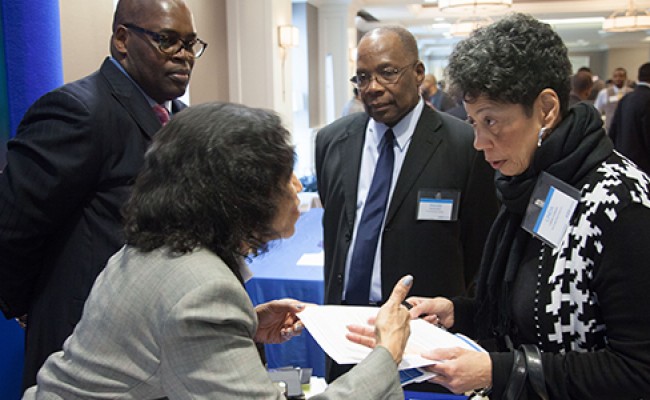Won’t you be my neighbor … and my business partner?
That’s what the Detroit Economic Growth Corporation (DEGC) hopes to accomplish with its Detroit to Detroit, or D2D, buyers program. D2D helps small suppliers become “Buyer-Ready Businesses” and gives them a chance to make direct, face-to-face contact with buyers from big purchasing organizations and learn first-hand what they require from their suppliers.

This year DEGC would like to see its 18-member Buyers Council purchase $1 billion in products and services from Detroit-based suppliers. It came close in 2014 when members of the Council purchased $925 million in products and services. Results for 2015 aren’t in yet.
“That $1 billion figure shows the value that Detroit’s anchor institutions have found in other Detroit companies,” says Detroit Mayor Mike Duggan. “They are buying local because it makes good business sense. There are terrific companies represented at this event, and that’s why the City of Detroit is here. We brought more than $20 million in city bidding opportunities with us, and we just might identify qualified suppliers for some of those right here.”
The city was one of many members of the Buyers Council who met with about 300 Detroit-based companies earlier this month at the 2016 D2D Matching Opportunity Event at the Greektown Casino Hotel.
While the event works like speed dating, it’s more like the eHarmony.com ad where Founder Neil Clark Warren says “eHarmony takes the time to find you that perfect someone.”
That’s how D2D works. Companies in the Buyers Council want to build long-term relationship with the companies they choose.
With a $3 billion annual spend, the City of Detroit is one of the businesses looking to work with more Detroit-based companies, and it encourages small businesses, minority suppliers, disadvantaged businesses and companies located in the city to apply.
“We are looking for partners, not just companies that want to do business with the city,” says Boysie Jackson, the city’s chief procurement officer. “We want you go come in and look at, in our particular area of expertise, how we can better this service to the city.”
The city’s contracting process gives Detroit-based companies preferences in their contract. “We give them percentage preferences to do business in the City of Detroit because they pay their taxes in the City of Detroit,” says Jackson, who was named Purchasing Manager of the Year in 2015 by the Michigan Public Purchasing Officers Association. He is modernizing the city’s purchasing process and plans to get it down to 30 days. It was 120 days when he took over in 2013.
Getting work with members of the Buyers Council requires would-be suppliers to do their homework. Know the company. Know its competitors and know who your competition would be.
“Nothing is more frustrating, and I’ve heard this from many of my colleagues as well, to have a supplier come to you and say ‘this is what I do, how can Comerica Bank use me?’” says Teresa LeFevre, vice president of supplier diversity at Comerica Bank.
Comerica Bank buys $540 million every year from outside suppliers, covering a wide variety of categories such as information technology, legal firms, construction and facilities maintenance, and office supplies. Most of the bank’s diversity spend is in IT.
LeFeve says it wants to work with smaller companies that are “bringing that new and better edge to the financial services industry.” Companies chosen must have at least two years of very stable financial history.
Another member of the Buyers Council Henry Ford Health System recommends providing a vendor profile by going to henryford.com/vendors. From there HFHS will reach out and, if the company qualifies, the bidding begins.
“We really focus on increasing utilization of women and minority firms within the organization as well as focusing on the number of locally-owned companies that we use within the supply chain,” says Sylvia L. Daniels, Henry Ford Health System’s supplier diversity coordinator.
There are many D2D success stories.
For example, Gregory B. O’Neal, president of O’Neal Contracting Group, LLC, was able to move his company forward at last year’s match game.
“Last year’s event gave me the jump pad that I needed to launch as a small Detroit business,” he says. “I was able to connect with Barbat Holdings and Eagle Construction Service, Inc. We are now in the midst of two collaborative projects with them. I am proud to participate and be a part of the D2D program.”
As HFHS’s Daniels says: “A healthy local economy is good for the health of the people who live here.”
Business owners who want to participate in D2D programs can start by visiting https://d2dbusiness.org and following the “Join D2D” link on the home page. Information about becoming a Detroit Certified Business can be found by following the Selling link on the D2D home page, or visiting https://www.detroitmi.gov/How-Do-I/Find/Human-Rights-Forms.
Members of the Buyers Council include, Bedrock Real Estate Services, Blue Cross Blue Shield of Michigan, Comerica Inc., Compuware, Crain Communications, DMC, DTE Energy, Ernst & Young, Ford Field, Greektown Casino Hotel, Henry Ford Health System, Lowe Campbell Ewald, Quicken Loans, Skidmore Studio, Strategic Staffing Solutions, University of Detroit Mercy, Urban Science and Wayne State University.
Editor’s note: To showcase more of what’s happening in Detroit neighborhoods we are collaborating with the Detroit Regional Chamber (DRC) and media partners to bring you coverage of the Detroit Policy Conference on February 24. Our media partners include Comcast, Detroit Unspun (Detroit Regional News Hub), WWJ Newsradio 950, 910AM Superstation The Pulse host Karen Dumas, WXYT 1270AM Small Talk with Mark S. Lee, and Detroit Smart Pages Publisher Beverly Smith, as well as our publishers alliance. You can also follow the coverage on our Twitter @DetroitUnspun.


